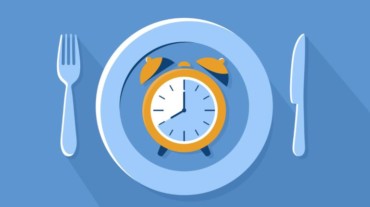
Perhaps, this relentless experimentation is also what lands me and my health into trouble sometimes. Well, that’s what happened when I decided to give intermittent fasting a try.
Basically, it involves eating only during a few hours of the day (eating window) and fasting for the rest of the hours (fasting window). Now, the fasting window can range anywhere
from 12 to 16 to even 24 hours depending on the type of intermittent fasting that you decide to try out.
Also, read: Considering taking up intermittent fasting? Take this quiz before you dive in
Now, karwachauth is enough of a torture for me. So, obviously, I ruled out the 24-hour fasting window option as soon as I got to know about it and settled for an 18-hour long fasting window that started from 8:00 pm (I finished my dinner by then) till 2:00 p.m.
The next day, I broke my fast with a huge glass of water, fruits, and cold coffee—taken at an interval of 30 minutes and followed by a hearty 400-calorie lunch, a light evening snack, along with a 400-calorie dinner later in the day.

Why did I decide to give this diet a try, you wonder?
If you’re a staunch believer/follower of intermittent fasting, pardon me for referring to it as a ‘diet’ instead of a ‘lifestyle’. But, intermittent fasting went out of my life too quickly. It’s totally not my style. Hence, for me, it remains a DIET that I tried and ended up regretting.
Anyway, let’s get to the point, shall we?
Apart from satisfying my adventurous streak, the other reason why I decided to give intermittent fasting a try is that it’s now bigger than ever on social media. In fact, several health influencers are following it.
The many benefits that they claim intermittent fasting has are even echoed by Dr. Namita Nadar, head nutritionist, Fortis Hospital, Noida, who I got in touch with to understand why exactly intermittent fasting backfired in my case.
Select Topics of your interest and let us customize your feed.
PERSONALISE NOW“Many people have observed that intermittent fasting has innumerable health benefits such as boosting energy, improving glucose homeostasis, increasing growth hormone (GH) production, reducing inflammation decreasing oxidative stress, lowering triglyceride (TG) levels and blood pressure, increasing and protecting brain function, increasing resistance to age-related diseases like immune disorders, cancer, heart disease, stroke, eye disease, Alzheimer’s and promoting longevity,” she said.
From the weight loss point of view (which was the real motivation in my case), she explained that intermittent fasting can promote weight loss and health while being an accessible and doable diet for many people.

“Some people may really like the fact that you get to eat a larger portion of food at once during intermittent fasting. This can leave one feeling more satiated. Additionally, the fact that you can still eat the same number of daily calories and don’t have to take away or change the food you eat is also something that makes this diet work for many.”
So, did it deliver its promise to me?
I believe that question was answered in the story’s title itself. But, just to make things clearer, here’s what happened: I GAINED WEIGHT.
As if having to skip breakfast and dragging my sluggish self to work in the morning on an empty stomach wasn’t enough of a torture, it came with a heavy price of weight gain. That’s not it. The after-meal discomfort was no less of a problem to deal with. You know what I mean, right?
What’s really the point of a diet if you have to succumb to swallowing ajwain to feel better after eating your meals?
Also, read: Yoga practitioners have a different take on intermittent fasting. Read on
But, why did it backfire?
Nadar solved this mystery by citing the following reasons for this diet turning into a tragedy for me:
1. Interference in social aspects of eating: Eating is very much a social activity. When you think about it, all of our celebrations, milestones and special occasions revolve around food. This new eating pattern does not match the usual eating style of most people. This is because of the shortened time frame you have for eating. It can be difficult for you in social gatherings where everyone else is eating and sipping on beverages, making you awkwardly stand out from the crowd.
Also, listen:
2. Binge feasting: “Some people may take the ‘eating’ periods as an opportunity to eat more calories than they really need. When you’re hungry, or you anticipate a period of fasting coming up, it can be very tempting to go hog wild at the first sight of food. If intermittent fasting is being practiced to reduce caloric intake, there is a chance that the feasting period spoils the hard work and disturbs the calorie deficit created by fasting,” she points out.
I wouldn’t deny preferring large meals at once after long hours of feeling deprived. Must’ve lost track of the calories somehow. But, what else can you expect from a hungry, deprived foodie, huh?
3. Digestive problems: “When we eat a large amount of food in a short amount of time, the body needs more time to digest it. This can cause additional stress on your gastrointestinal tract, leading to indigestion and bloating,” Nadar mentions, making the reason behind my post-meal discomfort crystal clear.
4. Nutritional deficiencies: According to Nadar, intermittent fasting can pose a serious risk of nutrient deficiencies, electrolyte abnormalities, as well as fertility and reproductive
issues in women.

Now, I did not practice it for long enough to know or claim if it really affected me that hard, but I surely can vouch for the nutritional-deficiency claim. I did really feel quite fatigued and weak, especially during the fasting window. The eating window went down the drain due to the post-meal sluggishness, heaviness, and discomfort.
5. Slower metabolism: Apart from overeating, intermittent fasting can slow down your metabolism. This is because when your body goes into starvation mode, it begins to use your muscle protein as a source of fuel and starts breaking down your muscles. In fact, a 24 hour long fast can lower your basal metabolic rate,” Nadar warns and adds that it can have negative implications on your health in the long run, especially if one is going through any underlying health conditions.
So, while intermittent fasting can work wonders for certain people, it really didn’t work for me.